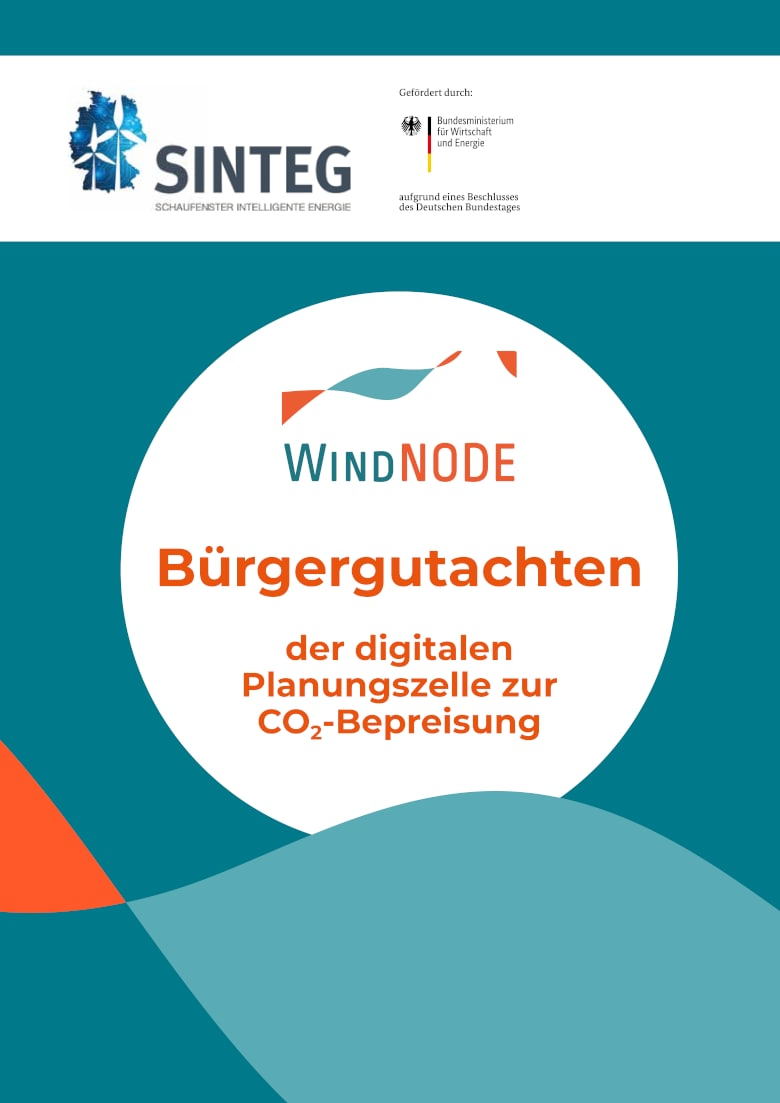During a virtual meeting at Greifswald city hall and via conference software ‘Zoom’, the citizens, the initiators and the conducting institute presented the result to the Mayor of Greifswald, Dr Fassbinder, on 15/12/2020. The organisation and performance took place in the scope of WindNODE, in collaboration with the Technical University of Berlin, the nexus institute, the city of Greifswald and the Institute for Climate Protection, Energy and Mobility (IKEM).
All collaborators as well as the general public were invited to participate online. The submission was, therefore, similar to the participation process: hybrid. This demonstrates that even in times of a pandemic, citizen’s expertises can be carried out successfully.
The expertise itself was presented at the meeting:
CO2 pricing means that a price is placed on the release of the greenhouse gas CO2, which was a “trivial offence” until recently, and furthermore regardless of where, by whom and to what end this greenhouse gas was released. Germany’s federal government decided such a CO2 pricing mechanism in its federal emission trade act (Bundesemissionshandelsgesetz, BEHG). As of January 2021, the release of one tonne of CO2 costs approximately 25 euros. This price is paid directly by fuel importers; of course, the consumers indirectly contribute as petrol, coal, gas and domestic fuel oil become more expensive as a result. This also makes products more expensive if a lot of CO2 was released during manufacturing.
This new climate policy instrument is merely the beginning. Many questions regarding the future amount, form and support of the pricing have been left unanswered wittingly by the federal government. Still, it is left unclear, how will this turn out? Is it useful or useless? Which parties are particularly impacted? Which accompanying measures are needed? Are we on board, or does it not go far enough for us? How important is climate protection to us? What are the regional effects?
Speech by Jan Suchanek, TU Berlin, Scientific Counselling
Esteemed Mr Mayor, Dr Fassbinder,
Dear citizens of Greifswald and surroundings,
Dear collaborators and members of the press,
About the background
In name of the German Federal Ministry for Economic Affairs and Energy, WindNODE is currently researching flexibility potentials in the energy system for a future with 100% renewable energy. Part of this is the WindNODE Academy, where experts exchange ideas amongst themselves. This much is true, the complexity of the matter is dependent on the importance of the discussion. We cannot allow only professionals to have this discussion between themselves. Rather, it is far more important to discuss energy policy as part of climate policy with all parties involved, and by all of us, we mean that each citizen is involved. That is why we have now conducted a planning cell to develop a citizen’s expertise.
For this purpose, a random sample from the civil register of Greifswald and surrounding area was taken, and citizens were invited to take part. Greifswald was chosen because one of the WindNODE partners is the Institute for Climate Protection, Energy and Mobility (IKEM). The topic of the planning cell was the introduction of a price for CO2 emissions. The German federal government decided this in 2019, and German CO2 emissions have been priced consecutively since January 2020. This has led to important changes in the traffic, building and mobility sectors. However, the federal government has left open which form this price should take in the future:
- Should it be increased, and if so, by how much?
- Which support measures are needed for an impartial arrangement?
21 citizens discussed these questions, moderated by the nexus institute, and a citizen’s expertise was drawn up. We are honoured to be able to present it to you today, Dr Fassbinder.
About the questions
Firstly, the research was concerned with the question, which proposals do citizens come up with? Secondly, how does this approach function, meaning the discussion among citizens in the form of a planning cell? Are we able to establish a good conversation with tangible results?
About the procedure
Planning for the procedure got underway before the pandemic broke out. This pandemic has, of course, created considerable challenges for us all. After all, it doesn’t only make it difficult to perform participation formats, but it also threatens to divert our attention from the urgency to discuss and search for solutions to humanity’s ongoing challenge in climate change.
I am happy with the decision to implement this planning cell, albeit in these testing times. I am grateful for the efforts of the experts, who in their short lectures explained matters that were not always easy to understand in layperson’s terms. I am especially happy and grateful for the efforts of the citizens and welcome their recommendations. For these provide policymakers with incentive and orientation.
About the results
The citizens recommend the introduction of a CO2 price as the start of an advisable policy to prevent climate change. Most can imagine an even higher price. Nevertheless, it becomes clear that the foundation of such policy must be based on the needs, capacity and the polluter-pays principle.
In all the mentioned areas (traffic, living, energy, but also consumption and agriculture), we need discussions, consensus and compensating or supporting measures. The individual proposals can be found in the citizen’s expertise, which I hereby present to you with both gratitude and hope.
Thank you very much.
In case of questions, please contact Mr Suchanek: suchanek@tu-berlin.de.
